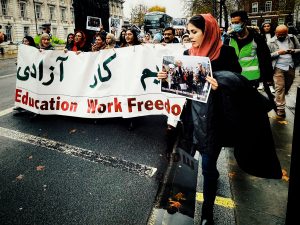June 8, marked 1,000 days that female students have been banned from secondary school in Afghanistan under the Taliban. For over two and a half years, we women’s rights and education activists have been counting the days, and we desperately call on the Taliban to reopen the doors of secondary schools for female students.
Afghanistan’s education system was already vulnerable under the former government. Afghanistan is a mountainous country and only children in cities and towns near the cities had access to education. Furthermore, even before the fall of Kabul several areas were under the control of the Taliban, and the Taliban didn’t allow female students in these villages to go to secondary school.
In 2021, the Taliban, having seized control of the country using force, issued a decree that targeted the hopes and dreams of millions of girls. At the time, the Taliban had mentioned that the ban would be temporary. However, in March 2022, when thousands of female students went to the doors of their schools with hope in their eyes, the Taliban didn’t allow them to enter. They went back to their homes with broken hearts.
Seeing this situation, I felt a deep pain in my heart. In the last 20 years, I had the opportunity to learn and study in school and university, but now millions of young pupils are banned from having their basic human rights.
I believed it was my moral duty and responsibility to do something for these girls, so I started an English class for girls in my neighborhood. After a time the Taliban searched our neighborhood houses for homeschools and I dissolved my class because of the risk to my family, my students, and myself.
However, I thought hard to find another solution. I felt like a soldier: If I can’t fight on this battlefield, I must find another one.
That was when one of my friends told me I could reach out to Mr. Richard Anderson, a retired U.S. Marine. Anderson is the founder of the U.S.-based “Freedom To Learn,” an online tutoring network for female and male students among Afghan allies in hiding in Afghanistan.
The situation was really critical. After the Taliban took power, thousands of Afghan people who had worked with the U.S., U.K. and other Western countries were in danger. Their children – both girls and boys – couldn’t go to school because of the need to remain in hiding.
At first, it was so difficult to teach. I hadn’t trained to teach in such circumstances: online teaching for people I don’t know and couldn’t see. My students and their families were also traumatized because of everyday fears and dangers.
Most of the time I was thinking that I couldn’t do it. It was a lot of stress and pressure; however, I loved my students and I continued to teach them. Today I’m so happy to know that the majority of my students and their families have left Afghanistan and resettled in their final destination. They are safe and they have access to a safe and healthy education.
Alongside that, our tutoring has expanded and with my colleagues, who are all tutors in hiding, we provide more classes. Meanwhile, the Taliban didn’t change their decision to ban girls from school. Instead, they opened more madrassa, where the situation is not good.
Two of my students in central Afghanistan go to these madrassas.
One day I asked them why, if they were going to school at madrassas, they still needed to join my online classes for English, mathematics, chemistry, etc.
My student replied, “Teacher, we go to madrassa; however we don’t study the subjects you teach us. She continued: “We don’t study English language and computer science subjects but we study and memorize everything in Arabic. Additionally, we love your classes and we don’t want to lose it.”
It made me happy to hear that my students love my classes; however, it was horrendous to hear that they don’t study these important subjects in the only formal education available to them. Her answer made it clear that the madrassas are only teaching the Taliban’s ideology, the ideology of jihad, which violates women’s and human rights in Afghanistan.
After 1,000 days I feel sad that in 2024 my country is the only country in the world where women and girls don’t have access to an education.
However, I’m happy that I finally found this opportunity to work with Freedom To Learn to offer my knowledge to teenage girls to support them in this hard time. I’ll keep calling and advocating and fighting for education for the girls and women in my country alongside other activists. It’s dangerous, but years before someone had fought for me to get an education. Now it’s my turn to do something for my people.
It has been a huge challenge these 1,000 days. However, we don’t give up. We will work harder to be prepared for a time when the Taliban no longer rules the country with an iron fist. A time when we could go forward and make up for the time lost as millions of young girls were kept far away from school and studying.

































